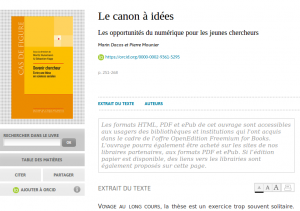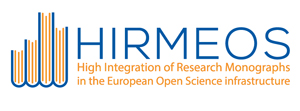The first major technical improvement of the publishing platforms involved in the project has been achieved. The Work Package lead by the Greek National Documentation Center (EKT) has enabled four of the five book platforms – Ubiquity Press had already implemented – to develop identification services with minimum shared standards. The platforms can now add unique identifiers to documents (DOI) and their authors (ORCID) and link them to research projects (Fundref).
Attributing DOI to books, which are normally identified through the traditional ISBN system, allow crosslinking to and from other publications and data through crosslinking services such as Crossref.
Currently, bibliographical references to the books and within the books published online don’t have links, and require the readers to check in a search engine if the reference can be accessed online and where.
Furthermore, ISBNs identify books but not book chapters. DOI can be attributed to book chapters, and at an even lower level of granularity (figures, tables). The granularity achieved by precise citation increases both efficiency (through saving users’ time) and impact (through vastly improved discoverability and exploitation of content).
Enabling crosslinking on books, HIRMEOS project facilitates users navigating between documents and between documents and data.
DOI, ORCID, Fundref.
- DOI (Digital Object Identifier) technology provides a unique digital identifier and an actionable, interoperable, persistent link for any object. DOI technology is actionable – through use of identifier syntax and network resolution mechanism (Handle System®). It is persistent – through combination of supporting improved handle infrastructure (registry database, proxy support, etc.) and social infrastructure (obligations by Registration Agencies). It is interoperable – through use of a data model providing semantic interoperability and grouping mechanisms. DOI has a governance structure: IDF, a US « not for profit » organization and is standardized as: ISO 26324, Information and Documentation — Digital Object Identifier System (2012)
- ORCID (Open Researcher and Contributor ID) is a nonproprietary alphanumeric code to uniquely identify scientific and other academic authors. This addresses the problem that a particular author’s contributions to the scientific literature or publications in the humanities can be hard to recognize as most personal names are not unique, they can change (such as with marriage), have cultural differences in name order, contain inconsistent use of first-name abbreviations and employ different writing systems. It provides a persistent identity for humans, similar to that created for content-related entities on digital networks by digital object identifiers (DOIs).The ORCID organization offers an open and independent registry intended to be the de facto standard for contributor identification in research and academic publishing.
- Fundref. Funding data provides a standard way to report funding sources for published scholarly research. Publishers deposit funding information from articles and other content using a standard taxonomy of funder names. This funding data is then made publicly available through Crossref’s search interfaces and APIs for funders and other interested parties to analyze. The Open Funder Registry provides a taxonomy of standardized funder names.
Implementations done
Here you can find a short presentation of the implementations of the services on the publishing platforms EKT e-Publishing, Göttingen University Press, OAPEN and OpenEdition.
EKT e-Publishing
EKT has developed a feature that provides each monograph’s view page with a link to the author’s ORCID account. One of the main improvements of the ebooks platform has been the DOI Deposit of the monographs DOIs by using the Crossref’s API.
EKT has also improved Open Monograph Press software in order to add funding information metadata to the submitted monographs. The tool that is being used allows the creator of the submission to choose a funding source from a list and add the grant number.
The monograph’s view page presents now the display of the monograph’s DOI.
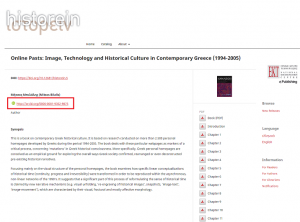
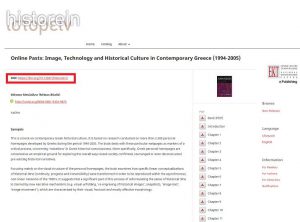
Göttingen University Press
Göttingen University Press (GUP) has been improved to include support for editorial staff by automatically finding and saving the ORCID of the authors of a book.
ORCID based service
- Browsing by and searching for creators will be based on IDs and not on names.
- On the book page, the feature “more publications from this/these author(s)/editor(s)” can be offered.
- In special lists of persons the ORCID ID will be presented explicitly next to the name and linked to the public ORCID data of the person.
- Optionally: Public ORCID data can be fetched, and they can be offered on the book page under “About these author(s)”
Alongside the names of all identified authors, information icons linked to the authors’ profiles are displayed. The icons of links to different profiles are distinguished by different colors.
For existing publications, new DOIs have been generated and registered via shell script. For new publications, the GUP publishing system automatically creates a DOI at submission time. Now GUP collects sponsorship information about publications. Funders are identified through the DOI of the publications based on the FundRef registry of Crossref. The information collected is then saved in a dedicated field in the local database. Funder resources are reported on the book page and the funders are linked to their publication lists in Crossref FundRef search.
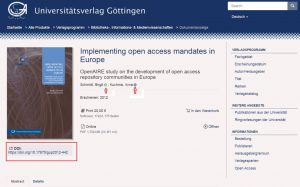
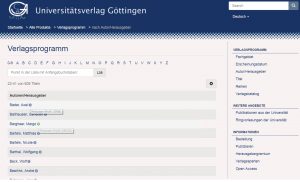
OAPEN
The platform of the OAPEN Library was not updated, as it already supports both ORCIDs and DOIs. However, a large percentage of the books and chapters available in the OAPEN Library did not contain a DOI. For this reason, OAPEN has registered over 1,500 books and chapters. At this moment, over 2,100 titles can be accessed by their DOI.
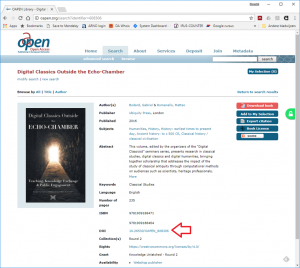
Since July 2017, as the result of HIRMEOS Work Package 2, OpenEdition Books platform allows authors to associate publications with their ORCID ID. It promotes a growing standard in the task of researchers’ names disambiguation and improves the visibility of OpenEdition Books publications.
In order to incorporate the ORCID IDs collection workflow as recommended by the best practices OpenEdition has subscribed an ORCID Membership. The membership allows OpenEdition to have a write access to the ORCID API so it can add / delete / update works on identified authors’ records. The ORCID IDs associated to publications are displayed on OpenEdition Books publications pages, as recommended by ORCID graphics integration chart.
OpenEdition
OpenEdition Books will also collect Funding information, via Crossref’s Funding registry service. Funders are identified by their name and ID, and a grant number can be associated to a funder.
